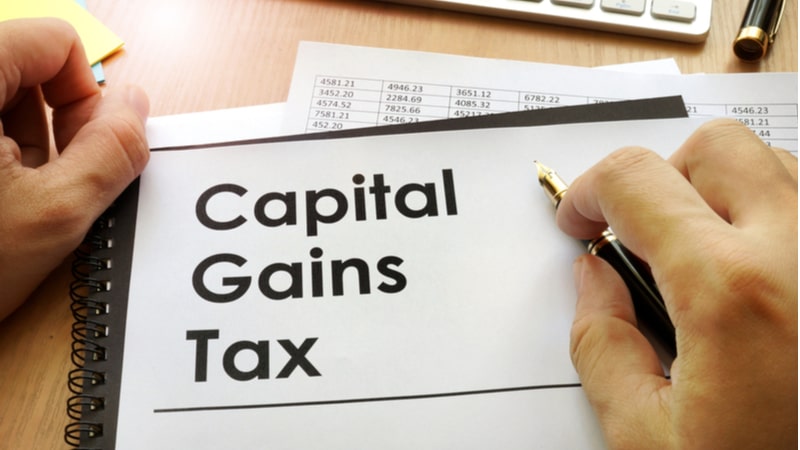How to calculate capital gains on sale of assets

People make investments in different asset classes for their financial goals. These include property, gold, stocks, mutual funds and debentures. If you sell the investments for a price that is more than the price at which you purchased them, you get gains. The gains you get by selling assets is called capital gains. Since this is a non-recurring income, the taxation for capital gains is different from recurring income such as your salary. Wondering how to calculate capital gains on sale of assets? Here’s how they are calculated and how taxation of these gains works.
What is a capital gain?
The definition for capital gains is any profit or gain that comes out of sale or transfer of a capital asset. Capital assets include property, gold, shares, mutual funds, among others.
How to calculate capital gains on property?
Capital gains are of two kinds. One is Short Term Capital Gains (STCG) and the other is Long Term Capital Gains (LTCG). The time for which you have the property with you will determine whether the capital gains you incur are short-term or long-term.
STCG for sale of property
If you sell the property within 2 years of purchasing it, it will be subject to STCG tax. Here’s the formula for STCG.
STCG on sale of property =Sale price– (purchase cost of property + cost of improvement of property + any other expense incurred on sale or transfer)
LTCG for sale of property
If you sell a property after holding it for more than two years, the gains you get will be LTCG gains.
Gross LTCG on sale of property =Sale price – (indexed purchase cost of property + indexed cost of improvement of property + any other expense incurred on sale or transfer)
Net LTCG =Gross LTCG – Exemption (if availed) under Section 54/54EC/54F
How to calculate indexation?
When you are calculating gains on sale of property, you must take into account the indexed cost of acquisition of the property and not the actual cost of acquisition. This is because thanks to inflation, the value of your money changes over time. The price you paid for the property will actually be worth much more as inflation tends to raise prices over time.
You need to use the Cost Inflation Index (CII) to calculate the indexed cost of property. The CII will give you the estimate of how costs have become inflated over time. The Indian government notifies the value of the index for the years. The base year for CII is 2001-02 and started at 100.
Here are the CII numbers for the last 10 years. The CII for AY 2020-21 will be announced next year.
| Financial Year | CII |
| 2020-2021 | 301 |
| 2019-20 | 289 |
| 2018-19 | 280 |
| 2017-18 | 272 |
| 2016 – 17 | 264 |
| 2015 – 16 | 254 |
| 2014 – 15 | 240 |
| 2013 – 14 | 220 |
| 2012 – 13 | 200 |
| 2011 – 12 | 184 |
Here is the formula to calculate the indexed cost of your property.
Indexed cost =Purchase price of property * (CII for present year / CII for year of purchase)
Once, you get the indexed cost price, you need to subtract the indexed cost from the actual sale price of the property. This will give you the actual LTCG.
For instance, you purchased a property in 2015 for Rs. 50,00,000 which you sold in 2019 for Rs.80,00,000. What will be the LTCG on sale of property?
| Cost of property purchase – 2015 | 50,00,000 |
| Sale price of property – 2019 | 80,00,000 |
| CII – 2015 | 254 |
| CII – 2019 | 289 |
| Indexed cost price | 50,00,000 * (289/254) =Rs.56,88,976 |
| LTCG | 80,00,000 – 56,98,729 =Rs.23,11,024 |
So, your actual gain after selling the property is not Rs. 30,00,000. It is only Rs. 23,11,024. This is the amount you should consider to calculate the tax on long term capital gain on property.
Tax on LTCG on sale of property
You need to pay LTCG at the rate of 20% with indexation benefits. Taking the above example, the tax payable will be Rs. 4,62,204, which is 20% of Rs. 23,11,024.
Tax on STCG on sale of property
When you incur STCG, it will be taxed as per your tax slab. So, the gains will be added to your total income for the year.
STCG and LTCG for mutual funds
If you sell your equity mutual funds in less than a year, you will get STCG. If you sell them after a year, it will be LTCG. For debt mutual funds, STCG is when you sell the debt funds in less than three years and LTCG is when you sell them after three years. With debt mutual funds, you get indexation benefits.
Tax on STCG & LTCG for mutual funds
For equity funds, STCG will be at 15% and LTCG will be at 10% if the gains are more than Rs. 1 lakh. For debt funds, STCG will be taxed as per your tax slab. For LTCG, you need to calculate the indexed cost of your mutual funds purchase and subtract it from mutual funds sale price to get LTCG. The tax will be at 20% on the indexed gains.
While there is not any exemption on STCG, you can get exemption on LTCG by investing in capital gain bonds or in another residential property if the LTCG is from sale of property. Senior citizens can get exemptions from capital gains if they are below the taxable income slab.

